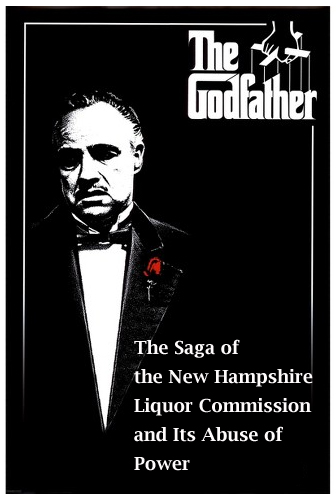 Given the recent events in New Hampshire in which the Liquor Commission has begun to block wine shipments to the state’s consumers, it is becoming abundantly clear that the Liquor Commission there can’t be trusted to fairly administer its regulatory responsibilities concerning the direct shipment of wine. Furthermore, it’s clear now that the responsibility for overseeing the direct shipment of wine must be taken out of the hands of the New Hampshire Liquor Commission. When a state entity is responsible for regulating its competitors, it’s bound to fall into implementing gangster tactics and this is exactly what is happening in New Hampshire.
Given the recent events in New Hampshire in which the Liquor Commission has begun to block wine shipments to the state’s consumers, it is becoming abundantly clear that the Liquor Commission there can’t be trusted to fairly administer its regulatory responsibilities concerning the direct shipment of wine. Furthermore, it’s clear now that the responsibility for overseeing the direct shipment of wine must be taken out of the hands of the New Hampshire Liquor Commission. When a state entity is responsible for regulating its competitors, it’s bound to fall into implementing gangster tactics and this is exactly what is happening in New Hampshire.
New Hampshire is a “control state” where the Liquor Commission is responsible for both the wholesaling and retailing of wine. Yet, for years state law has explicitly allowed out-of-state wineries, retailers and wine-of-the-month clubs to obtain permits to ship wine to the state’s consumers. This ability to source wine from out-of-state sources has served as an important outlet for Granite State consumers who often can’t find rare, collectible and small production wines in the state stores. Out-of-state retailers have been of particular importance. Despite holding no more than 6% of the New Hampshire-issued direct wine shipping permits, retailers were responsible for 27% of sales of wine shipped to the state’s consumers in 2017.
In December, the Liquor Commission decided it didn’t want to compete with out-of-state fine wine retailers any more and authored a bill that would have stripped these out-of-state wine stores, auction houses, retailers and wine clubs of their right to obtain a wine shipping permit. That bill, SB 353, failed spectacularly. In February, the Senate Commerce Committee unanimously rejected it after hundreds of New Hampshire consumers wrote to Committee members and voiced their outrage. After the Commerce Committee rejected the bill, the entire Senate “tabled” SB 353, effectively killing it and the Commission’s plan to block all retailer wine shipments.
Yet in a spectacular usurpation of legislative authority, against the will of the state’s lawmakers, and in a complete abuse of power, the Liquor Commission began in February arbitrarily denying all applications for shipping permits from out-of-state wine retailers along with applications for renewal of shipping permits from out-of-state retailers and wine clubs that had been shipping legally for years. The Commission began doing what the state legislature told them they may not do.
This kind of abuse of power is exactly the kind of thing that can happen when a state that controls wine sales also regulates its competitors. The New Hampshire liquor commission begins to look like gangsters not willing to cede any territory. The “Gangster” analogy is particularly applicable when you consider that recently the Liquor Commission has come under fire for allegedly participating in bootlegging and money laundering schemes by selling huge amounts of liquor to out of state buyers who use cash to purchase the liquor, but break up their purchases so they come in just under the $10,000 threshold that would require the reporting of the transaction.
Bootlegging. Money Laundering. Aggressively Curtailing Competiton. Capone would be envious.
The Liquor Commission says they have the power to sanction out of state shippers if those shipments of wine are “diverting” revenue from the state. They claim that out of state retailers are selling and shipping wine to New Hampshire consumers that the Commission itself stocks and sells. Yet according to the Liquor Commission’s own testimony in front of lawmakers, the amount of wine shipped to New Hampshire consumers in 2017 amounted to less than one-half of one percent of the total revenues of Commision sales during the year. Moreover, the commission is denying shipping permits to new applicants for direct shipper permits who have yet to ship a single bottle of wine into New Hampshire, making it impossible to deny these applications on the basis that their shipments are “diverting revenue” from the state.
What is really going on is blackmail.
At this moment the New Hampshire Liquor Commission is attempting to push a new bill (HB 1626) that, in its amended form, would only allow retailer wine shipments from retailers in those states whose law allow shipments from out-of-state: a reciprocal policy. If successful this bill, it would cut off retailer wine shipments from stores and clubs in New York, Illinois, Florida, Texas, District of Columbia, Washington State—all but 13 states. It would severely reduce the access to wines that New Hampshire consumers currently enjoy.
The blackmail is simple: Either get on board with this new, much more restrictive retailer wine shipping law or we will deny all shipments into the state by retailers.
This isn’t the change in the law that the New Hampshire legislature should be considering. Instead, it should be considering and embracing a law that takes regulation of direct shipments out of the hands of the state Liquor Commission and places that responsibility with a body that isn’t competing with the out-of-state shippers. This is the only way to assure that gangster tactics are not employed against competitors. It’s the only way to assure real competition. And it’s the only way to assure an honest and well regulated free market in wine shipments.